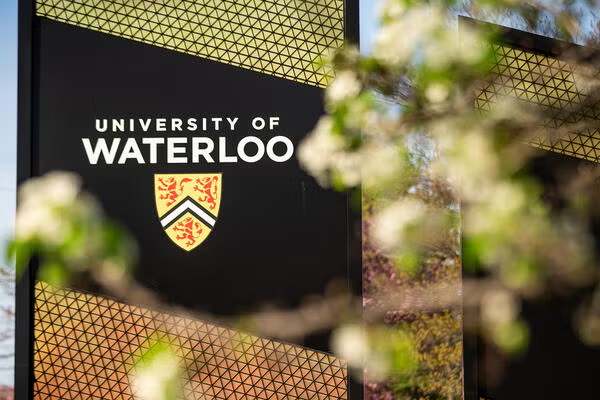
More than $1.3 million awarded to Waterloo researchers
Four Waterloo professors receive federal funding to support small modular reactors research

Four Waterloo professors receive federal funding to support small modular reactors research
By Angelica Marie Sanchez University RelationsThe Government of Canada has awarded more than $1.3 million to University of Waterloo researchers to support small modular reactors (SMRs) research using nuclear energy and materials to protect health, safety, security and the environment.
The funding is part of the NSERC-CNSC Small Modular Reactors Research Grant through the Natural Sciences and Engineering Research Council of Canada (NSERC) and the Canadian Nuclear Safety Commission (CNSC).
SMRs offer a promising pathway to support Canada’s low carbon energy transition and are expected to be less complex, easier to operate and more cost effective than current nuclear technology. The research conducted at Waterloo will provide a new generation of nuclear scientists, engineers and policymakers with an enhanced understanding of the safe and efficient operation of SMRs, while further advancing the field of nuclear power generation.
“Congratulations to our researchers on receiving more than $1.3 million in funding through the Small Modular Reactors Research Grant Initiative from NSERC and the Canadian Nuclear Safety Commission,” said Dr. Charmaine Dean, vice-president Research and International. “This funding will allow researchers at Waterloo to undertake high-impact research, and, importantly, will support the training of highly qualified personnel to fill a critical gap in this area for Canada.”
The following Waterloo researchers will receive funding for the duration of their project grant.
 Hyock Ju Kwon
Hyock Ju Kwon
Professor, Mechanical and Mechatronics Engineering
$360,000 (3 years)
Development of materials surveillance technology for SMRs
Kwon’s research focuses on how structural materials degrade in the harsh environment inside nuclear reactors, which often involves high temperatures, severe irradiation and corrosive conditions, in order to develop a materials surveillance technology that can identify when and where critical failures are likely to occur in operating SMRs.
This research will provide critical information for the safe structural design of SMRs, while ensuring that key structural components maintain their functionality and integrity over the entire design life. The project will also support the Canadian government in developing standards and codes for the safe design and operation of SMRs.
 Fue-Sang Lien
Fue-Sang Lien
Professor, Mechanical and Mechatronics Engineering
$250,000 (3 years)
Development of a multiscale multiphysics simulation toolset with uncertainty for nuclear safety assessment, design and licensing of SMRs
Lien’s research involves developing an advanced integrated modelling toolset for nuclear safety assessment. This toolset combines physics-based computer modelling and the simulation of advanced SMRs with a comprehensive quantification of all uncertainties that can arise.
Creating this multiscale, multiphysics simulation toolset enables an end-to-end uncertainty quantification and principled safety analysis, prediction, and decision-making framework for SMRs. It will also support the next generation of advanced nuclear reactor technologies based on non-light water coolants such as molten salt, liquid metal and gas that will need to be assessed, monitored and controlled throughout their life cycle.
 Siby Samuel
Siby Samuel
Professor, Systems Design Engineering
$360,000 (3 years)
Addressing human factors challenges for control room operators in SMRs
Samuel’s research investigates how Human Factors (HF) design issues can arise due to technological innovations and operations. Operators may experience increased cognitive demands while monitoring several reactor units simultaneously from a central main control room or remote monitoring units — automated procedures may reduce human error, but they may also lower operator awareness in cases where operators need to establish a suitable mental model of plant conditions.
This research provides a solution by using an adaptive and assistive AR interface that will intervene in real-time when high levels of workload or low levels of situational awareness are recognized. The results will provide innovative expertise and scientific data to improve government regulatory supervision of SMRs.
 Conrard Giresse Tetsassi Feugmo
Conrard Giresse Tetsassi Feugmo
Professor, Chemistry
$356,949 (3 years)
Multiscale modelling of refractory high-entropy alloys materials for SMRs
Feugmo’s research is dedicated to the design of refractory high entropy alloys (HEA) specifically tailored to meet the requirements of SMRs vessels, and to the development of computational models that predict their behaviour.
During reactor operation, the pressure vessel material experiences severe conditions which can lead to localized embrittlement in the vessel and welds within the reactor core. Given the irreplaceability of the vessel, the development of new materials that can withstand these conditions is required.
HEAs are a promising option due to their composition, however, current knowledge of HEAs properties is less advanced compared with conventional alloys. Feugmo’s research will enhance our knowledge of material responses and guide the development of robust and resilient materials specifically designed for SMR vessels.

Read more
Here are the people and events behind some of this year’s most compelling Waterloo stories

Read more
Dr. Anita Layton and Dr. Kerstin Dautenhahn complete their C150 terms but their research impacting the future of health and technology continue

Read more
From regenerative medicine, closed-loop health monitoring, Indigenous approaches to architectural design and more, the funding supports future-focused projects
The University of Waterloo acknowledges that much of our work takes place on the traditional territory of the Neutral, Anishinaabeg, and Haudenosaunee peoples. Our main campus is situated on the Haldimand Tract, the land granted to the Six Nations that includes six miles on each side of the Grand River. Our active work toward reconciliation takes place across our campuses through research, learning, teaching, and community building, and is co-ordinated within the Office of Indigenous Relations.